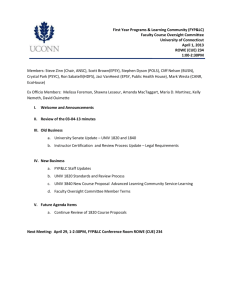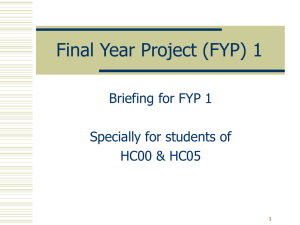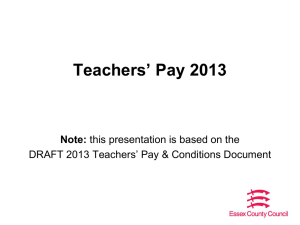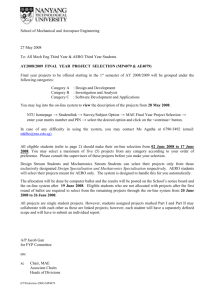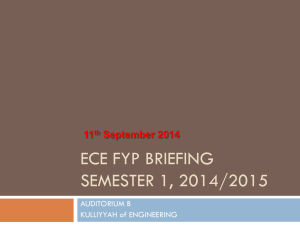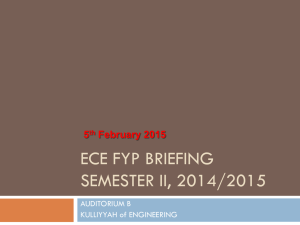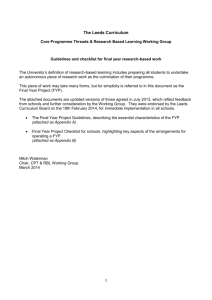Success of Foundation Degree students to final year UH
advertisement
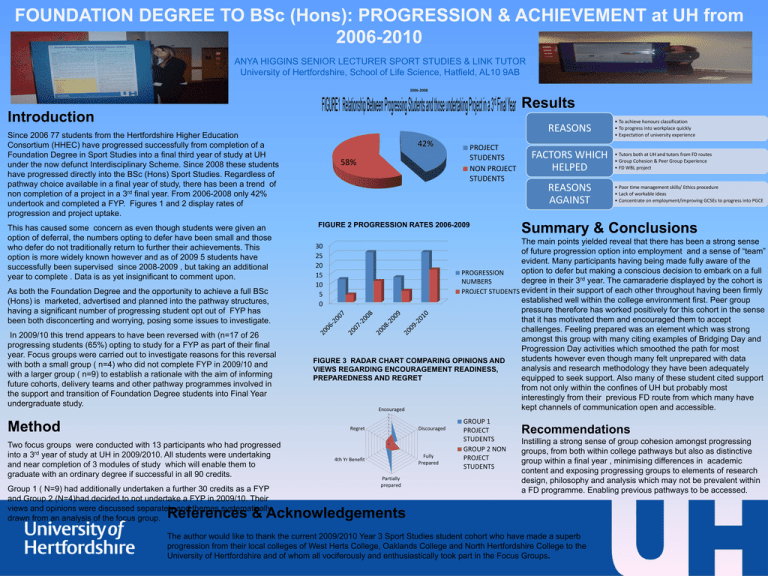
FOUNDATION DEGREE TO BSc (Hons): PROGRESSION & ACHIEVEMENT at UH from 2006-2010 ANYA HIGGINS SENIOR LECTURER SPORT STUDIES & LINK TUTOR University of Hertfordshire, School of Life Science, Hatfield, AL10 9AB 2006-2008 Results Introduction Since 2006 77 students from the Hertfordshire Higher Education Consortium (HHEC) have progressed successfully from completion of a Foundation Degree in Sport Studies into a final third year of study at UH under the now defunct Interdisciplinary Scheme. Since 2008 these students have progressed directly into the BSc (Hons) Sport Studies. Regardless of pathway choice available in a final year of study, there has been a trend of non completion of a project in a 3rd final year. From 2006-2008 only 42% undertook and completed a FYP. Figures 1 and 2 display rates of progression and project uptake. This has caused some concern as even though students were given an option of deferral, the numbers opting to defer have been small and those who defer do not traditionally return to further their achievements. This option is more widely known however and as of 2009 5 students have successfully been supervised since 2008-2009 , but taking an additional year to complete . Data is as yet insignificant to comment upon. As both the Foundation Degree and the opportunity to achieve a full BSc (Hons) is marketed, advertised and planned into the pathway structures, having a significant number of progressing student opt out of FYP has been both disconcerting and worrying, posing some issues to investigate. In 2009/10 this trend appears to have been reversed with (n=17 of 26 progressing students (65%) opting to study for a FYP as part of their final year. Focus groups were carried out to investigate reasons for this reversal with both a small group ( n=4) who did not complete FYP in 2009/10 and with a larger group ( n=9) to establish a rationale with the aim of informing future cohorts, delivery teams and other pathway programmes involved in the support and transition of Foundation Degree students into Final Year undergraduate study. Method REASONS 42% 58% FIGURE 2 PROGRESSION RATES 2006-2009 Group 1 ( N=9) had additionally undertaken a further 30 credits as a FYP and Group 2 (N=4)had decided to not undertake a FYP in 2009/10. Their views and opinions were discussed separately and themes systematically drawn from an analysis of the focus group. FACTORS WHICH HELPED REASONS AGAINST • Tutors both at UH and tutors from FD routes • Group Cohesion & Peer Group Experience • FD WBL project • Poor time management skills/ Ethics procedure • Lack of workable ideas • Concentrate on employment/improving GCSEs to progress into PGCE Summary & Conclusions The main points yielded reveal that there has been a strong sense 30 of future progression option into employment and a sense of “team” 25 evident. Many participants having being made fully aware of the 20 option to defer but making a conscious decision to embark on a full PROGRESSION 15 rd year. The camaraderie displayed by the cohort is degree in their 3 NUMBERS 10 evident in their support of each other throughout having been firmly PROJECT STUDENTS 5 established well within the college environment first. Peer group 0 pressure therefore has worked positively for this cohort in the sense that it has motivated them and encouraged them to accept challenges. Feeling prepared was an element which was strong amongst this group with many citing examples of Bridging Day and Progression Day activities which smoothed the path for most students however even though many felt unprepared with data FIGURE 3 RADAR CHART COMPARING OPINIONS AND analysis and research methodology they have been adequately VIEWS REGARDING ENCOURAGEMENT READINESS, PREPAREDNESS AND REGRET equipped to seek support. Also many of these student cited support from not only within the confines of UH but probably most interestingly from their previous FD route from which many have kept channels of communication open and accessible. Encouraged Regret Two focus groups were conducted with 13 participants who had progressed into a 3rd year of study at UH in 2009/2010. All students were undertaking and near completion of 3 modules of study which will enable them to graduate with an ordinary degree if successful in all 90 credits. PROJECT STUDENTS NON PROJECT STUDENTS • To achieve honours classification • To progress into workplace quickly • Expectation of university experience 9 8 7 6 5 4 3 2 1 0 Discouraged Fully Prepared 4th Yr Benefit Partially prepared GROUP 1 PROJECT STUDENTS GROUP 2 NON PROJECT STUDENTS Recommendations Instilling a strong sense of group cohesion amongst progressing groups, from both within college pathways but also as distinctive group within a final year , minimising differences in academic content and exposing progressing groups to elements of research design, philosophy and analysis which may not be prevalent within a FD programme. Enabling previous pathways to be accessed. References & Acknowledgements The author would like to thank the current 2009/2010 Year 3 Sport Studies student cohort who have made a superb progression from their local colleges of West Herts College, Oaklands College and North Hertfordshire College to the University of Hertfordshire and of whom all vociferously and enthusiastically took part in the Focus Groups.
